Mixed Bag Vol. 10
We found a bag full of wine. It calls for a party.
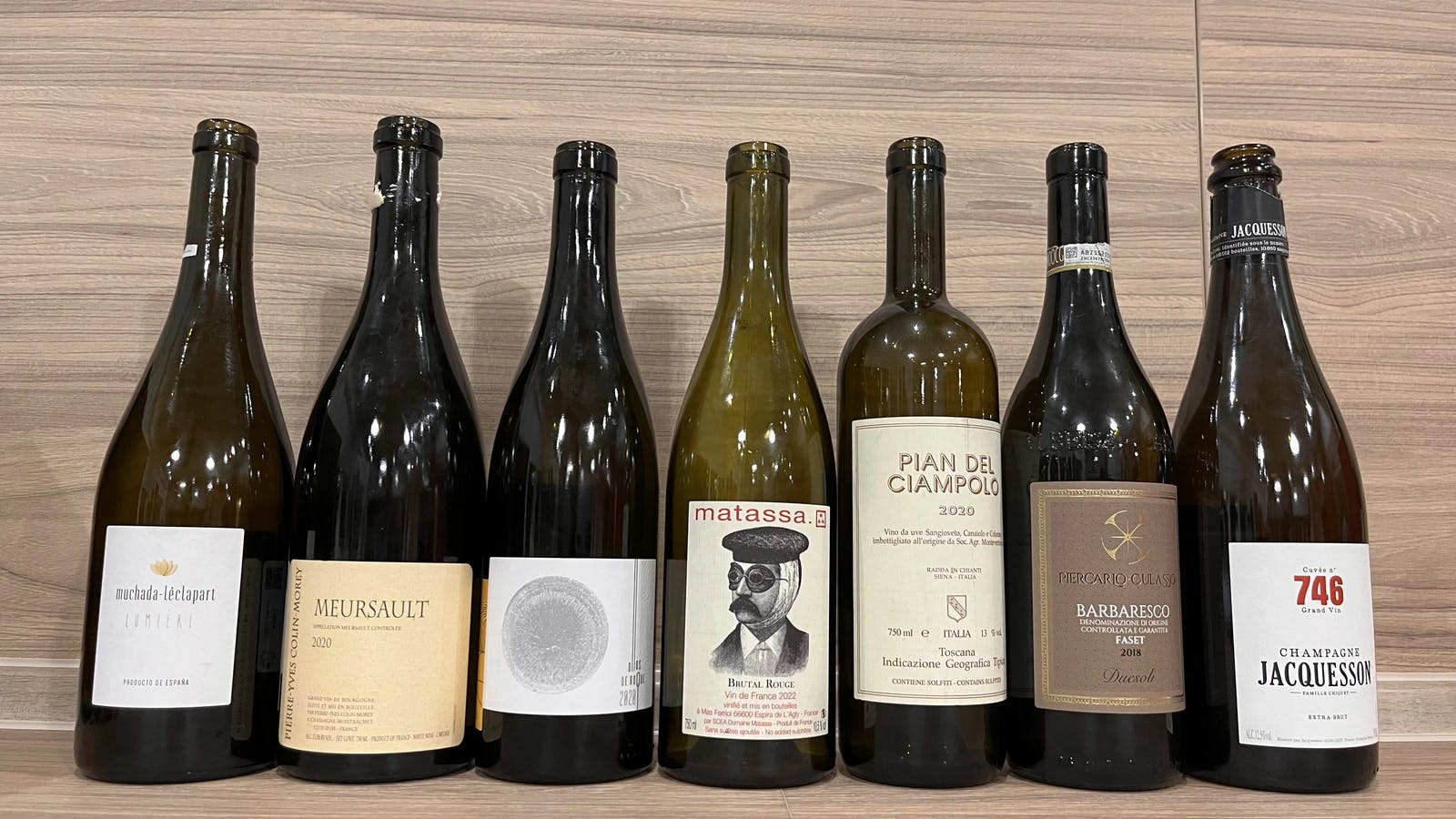
The concept behind Mixed Bag is straightforward. The majority of my backpacks are spacious enough to carry a sufficient number of bottles for at least one wine-tasting event. Typically, my backpack houses a varied assortment of bottles. Essentially, Mixed Bag has always been centred around experimenting with different lineups and the flexibility to cater to the tastes and preferences of the attendees. This occasion brings together a notably diverse group, hence the variety in styles and methodologies evident today. However, there's a unifying element in all the bottles we're sampling. Most of the winemakers whose creations we're exploring today have introduced innovative elements to the world of wine. And that's exactly what we're here to experience.
Muchada-Léclapart Lumière 2017
- Region
- Spain » Vino de Mesa
- Type
- white still, dry
- Producer
- Wine
- Vintage
- 2017
- Grapes
- Palomino
- Alcohol
- 12.5
- Volume
- 750 mL
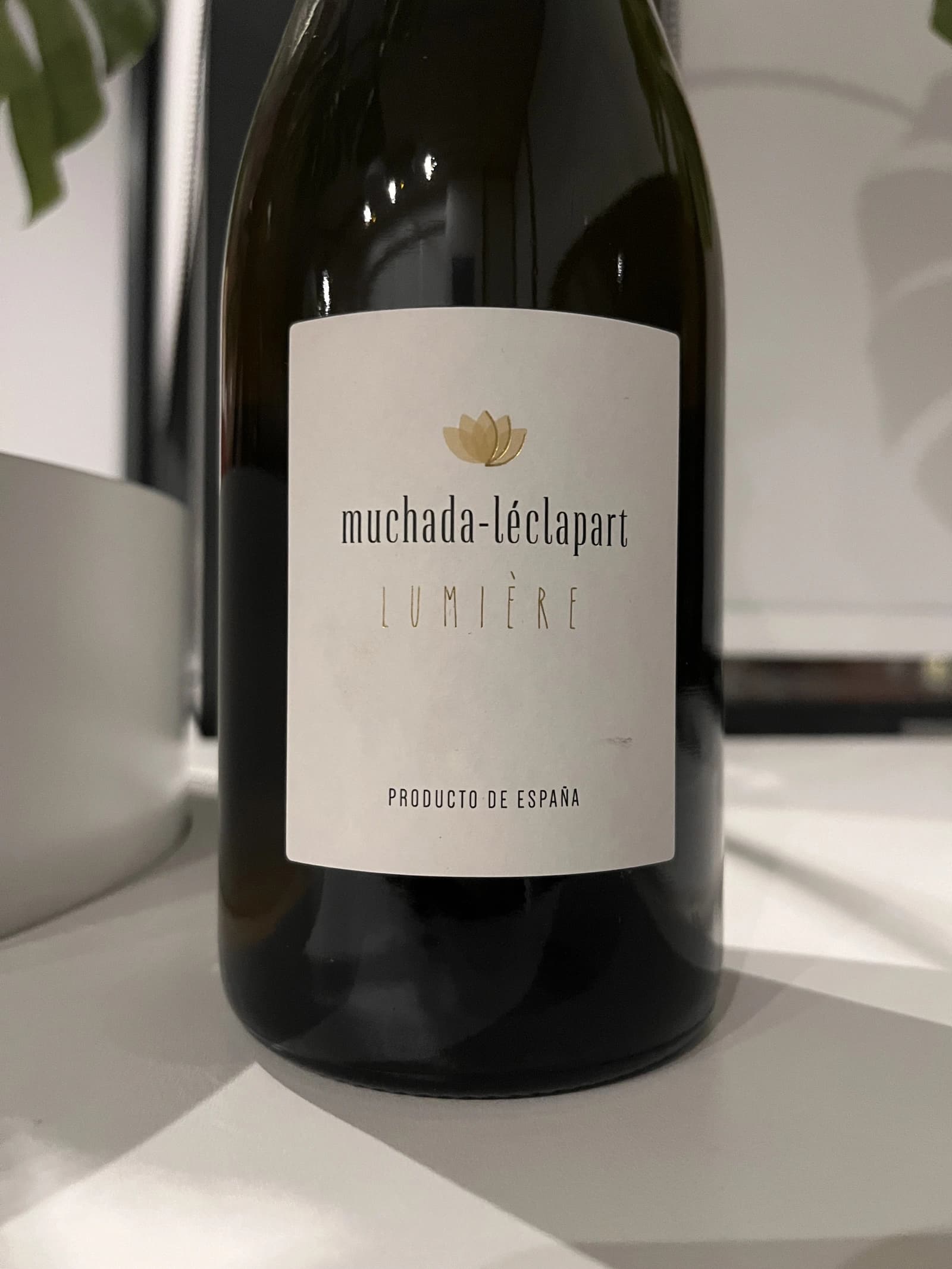
This wine secured the 🏅 5th place in our wine tasting lineup.
Muchada-Léclapart, a collaborative winemaking project between David Léclapart, a distinguished French Champagne producer, and Alejandro Muchada, a skilled winegrower from Cádiz, represents an innovative venture in the historic wine region of Marco de Jerez, located on the Atlantic coast of Andalusia. Their mission is centred on creating a sublime white wine, distinctively without a flower veil and fortification, focusing on the revered Albariza soil and the Palomino grape, the heart and soul of Jerez.
Their vineyards, encompassing three hectares, are nestled within the prime viticultural lands of Sanlúcar de Barrameda, in the esteemed Pago Miraflores. Benefitting from the cool maritime climate provided by the nearby Atlantic Ocean, the vineyards comprise mainly old vines from ancient mass selections of Palomino fino and Muscat from Chipiona. These plots, including La Platera, Miraflores Alta, and Camino del Puerto, are each unique in their soil composition and vine age, contributing distinct qualities to the grapes.
The winemaking philosophy at Muchada-Léclapart is deeply rooted in biodynamic and organic practices, with an ongoing transition towards official certification. Their approach is one of minimal intervention: eschewing rotavators to protect the living soils, avoiding herbicides and pesticides, and employing surface ploughs for soil management. This dedication extends to their vineyards, where they practice careful pruning and limit yields to between 5000 and 8000 kg per hectare. This lower yield, a mere third of the usual production in the area, is instrumental in achieving a balance of quality and concentration, highlighting the nuanced character and subtle elegance of the well-crafted Palomino grape.
In their cellar, every detail is meticulously managed to ensure the integrity of the wine. The harvest, conducted manually in the early morning to avoid grape heating, is followed by a gentle four-hour pressing using a Champagne press. Fermentation is spontaneous, without the addition of selected yeasts or acids, and only a minimal amount of sulfur is used. The wine matures on its lees for nine months without disturbance and is then bottled without filtering or cold stabilizing to retain all its aromatic complexity and nuances.
Lumière, the flagship wine of Muchada-Léclapart, epitomizes their vision: a wine that is balanced, serene and imbued with a saline elegance. Sourced from the best plot, La Platera, located on a gentle hill in the Pago Miraflores and facing west, this wine is a testament to the harmony achieved between wood, soil, and fruit. Made from 100% old Palomino vines, aged 65 years, the Lumière stands out for its floral aromatics and distinctive notes of gunpowder, typical of a grand Pago. The wine undergoes fermentation and vinification in used Bordeaux barrels, remaining true to the spontaneous fermentation approach, with minimal intervention and a focus on lees work.
Producing 2,000 to 4,000 bottles annually, Muchada-Léclapart's Lumière is a wine that truly reflects the unique terroir of its origin. It is a wine that invites contemplation and appreciation, a beacon of the palomino grape's lively subtlety, and a clear representation of the meticulous and traditional winemaking practices of Muchada-Léclapart.
Pierre-Yves Colin-Morey Meursault Village 2020
- Region
- France » Burgundy » Côte d'Or » Côte de Beaune » Meursault AOC
- Type
- white still, dry
- Producer
- Wine
- Vintage
- 2020
- Grapes
- Chardonnay
- Alcohol
- 13.5
- Sugar
- 1
- Volume
- 750 mL
- Find at
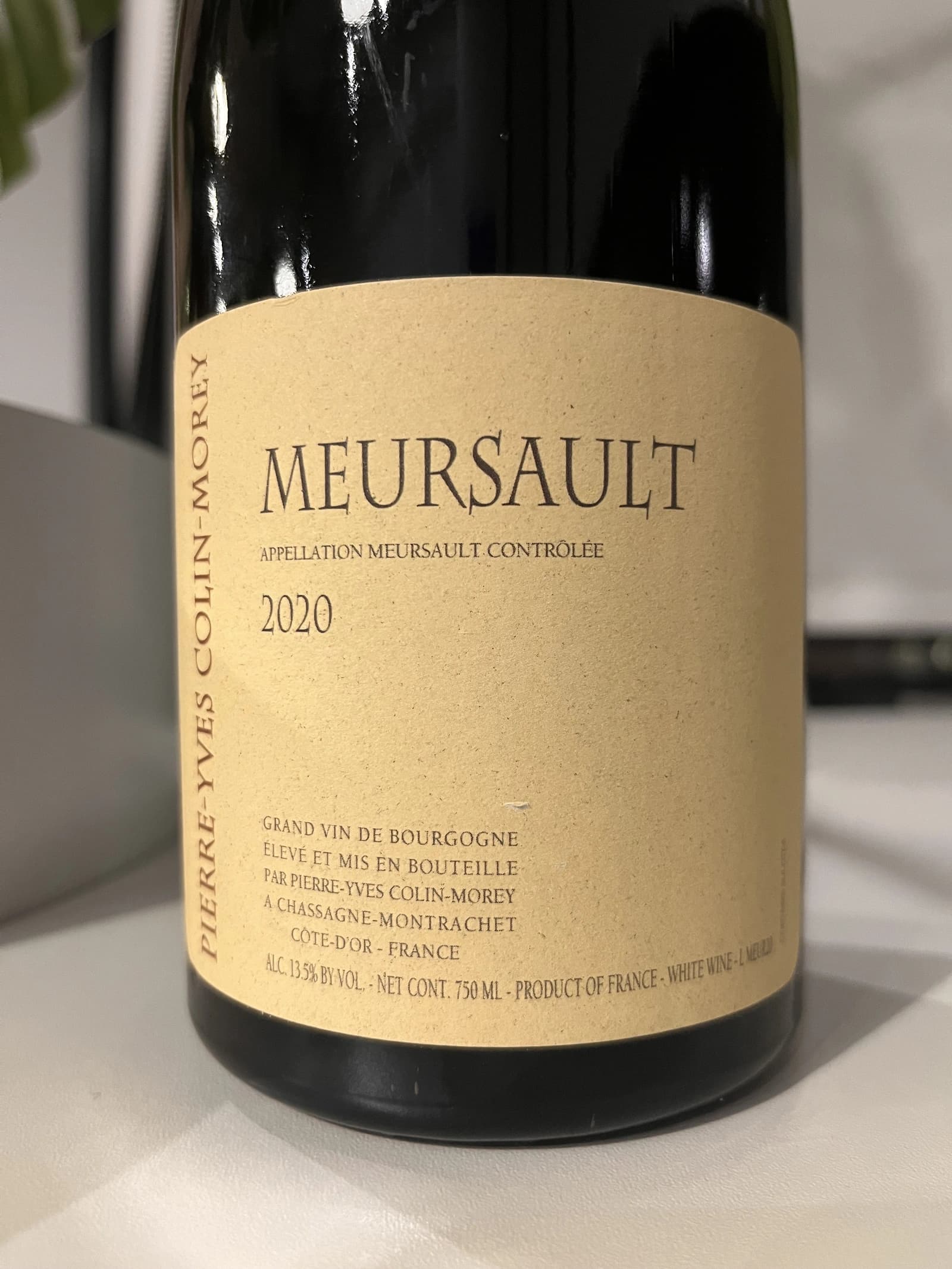
This wine secured the 🥈 2nd place in our wine tasting lineup.
Pierre-Yves Colin-Morey, established in the esteemed wine region of Chassagne-Montrachet in Burgundy, France, represents a fusion of two prominent Burgundian winemaking families. Pierre-Yves, the eldest son of Marc Colin, and his wife Caroline Morey, from the Jean-Marc Morey lineage, have created a legacy that is deeply rooted in the traditions and terroir of Burgundy. Since its inception, the winery has garnered a reputation for producing some of the finest Chardonnays in the region, characterized by their minerality and longevity.
After working at his father's domaine from 1994 to 2005, Pierre-Yves ventured to establish his winery, bringing with him a six-hectare inheritance of vineyards. This move marked a significant shift in his winemaking approach, notably in response to the challenge of premature oxidation. Pierre-Yves eliminated battonage and ceased heating his cellar to promote malolactic fermentation. His refined techniques, including longer barrel ageing with minimal new wood and sealing bottles with wax, have significantly enhanced the quality and uniqueness of his wines. Pierre-Yves's vineyards, primarily located in St-Aubin and Chassagne-Montrachet, include notable premiers crus and village appellations. Additionally, his négociant business allows him to source high-quality grapes from other renowned vineyards in Puligny-Montrachet, Meursault, and even grand crus sites, enriching his portfolio with a diverse range of exceptional wines.
The winery's commitment to minimal intervention and lutte raisonnée1 is evident in the use of larger demi-muid barrels for ageing, a practice Pierre-Yves believes enhances the wines' energy, freshness, and terroir-driven characteristics. Unlike many locals, Pierre-Yves uses 350L barrels (instead of 225L) and also ages his wines for a longer period of 18 months (vs 12 months). This approach results in less pronounced oak flavours and creaminess, allowing the natural qualities of the Chardonnay grape to shine through.
With his sons, Mathis and Clément, now joining the family domaine, Pierre-Yves Colin-Morey continues to set a high standard in Burgundian winemaking. Their wines, renowned for their reductive and leesy style, demonstrate a remarkable ageing potential.
Fazenda Agricola Augalevada Ollos de Roque 2020
- Region
- Spain » Vino de Mesa
- Type
- white still, dry
- Producer
- Wine
- Vintage
- 2020
- Grapes
- Treixadura, Lado
- Alcohol
- 12
- Sugar
- 0.29
- Volume
- 750 mL
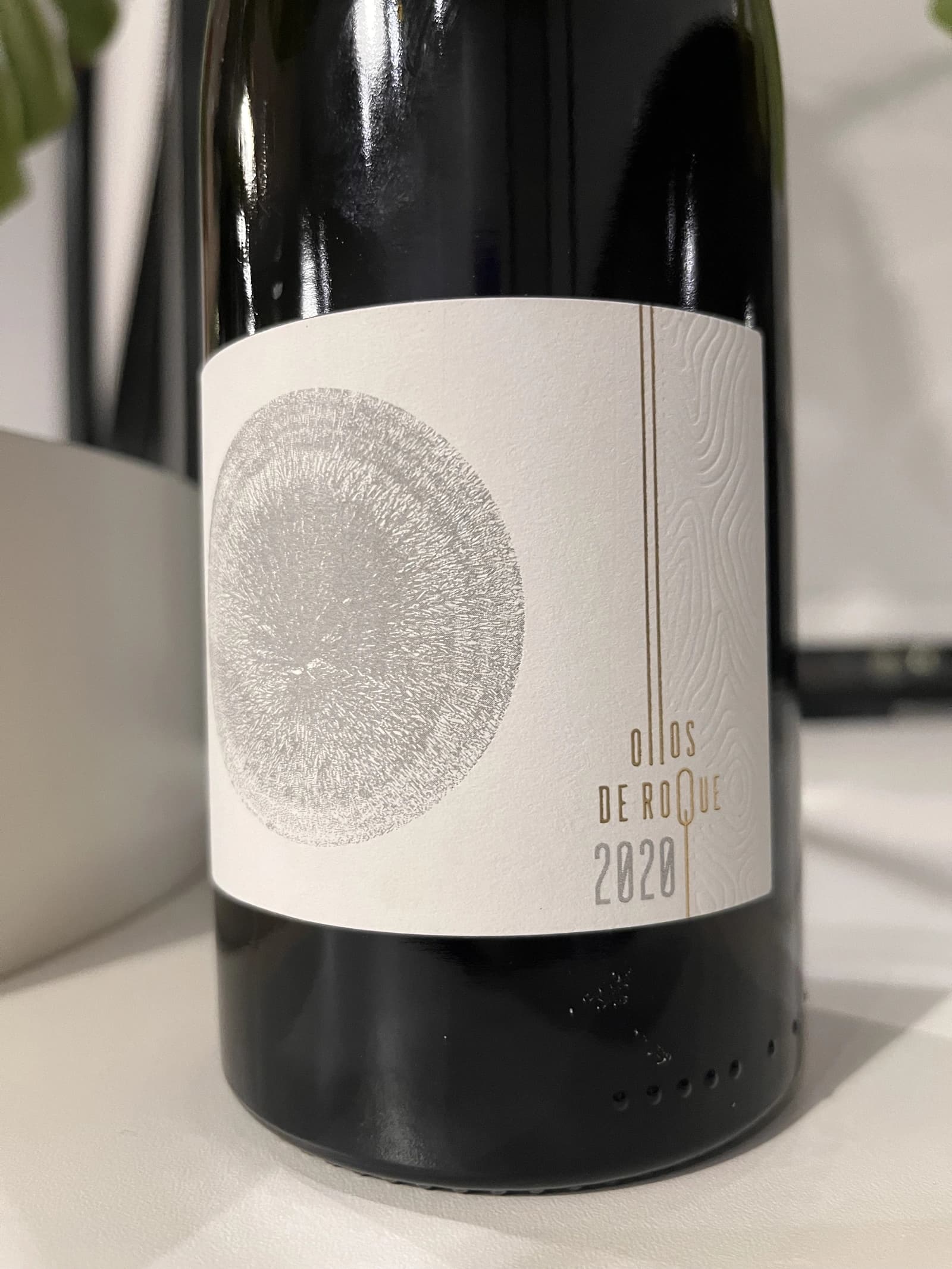
This wine secured the 🥇 1st place in our wine tasting lineup.
There are few viticultural regions as dramatic, wild, and diverse as Ribeira Sacra. Being a boundary between the cool, rainy Atlantic coast and Spain's hot, dry interior, Ribeira Sacra enjoys the best and the worst of the two domains. The main threats to viticulture are the storms that blow in from the Atlantic, bringing plenty of rain and wind; and morning fogs. A paradise for fungus. And yet people grow vines and make wines here. Some locals even practice organic and biodynamic farming. And that's truly heroic.
Among them is Iago Garrido. Due to constant rain and humidity, mildew growth becomes almost uncontrollable in the region. As a result, vineyards require more frequent copper and sulfur treatments compared to other drier wine regions. The majority of the vineyards where Iago works are inaccessible by machines, therefore, most of the work is done by hand. This inaccessibility also motivates growers to use chemicals as manual labor is too expensive if the wines cannot be sold for a price to offset the extra cost. Despite these challenges, Iago sticks to organic farming with biodynamic practices.
In 2014, Iago released his first wine called Ollos de Roque (Eyes of Roque). He produced two versions of it; a commercial variant and an experimental one called Número Dous (Number Two in Galician), which he kept for private use. The former was aged in oak barrels, while the latter was vinified in buried amphorae and aged under the influence of flor. Initially, Iago thought that using amphorae was a mistake, so he decided to sell the oak version. However, his friends started to tell him how much they liked Número Dous, and Iago also found the same pleasure in this wine.
Número Dous provided Iago with a clear path, and what was a mere accident to avoid in the future became the central focus of the entire range. Nowadays, all his wines have varying levels of flor influence (even red wines).
Ollos de Roque, the flagship wine of the Fazenda, is produced from vines that are relatively young, with many grafted onto youthful rootstocks. The grapes are exclusively sourced from the organically and biodynamically cultivated Augalevada vineyard, which is characterized by its granite composition. This vineyard yields a blend of Treixadura, Lado, and Agudelo grapes, each contributing unique qualities to the wine.
The winemaking process for Ollos de Roque involves the direct pressing of the grapes, followed by a fermentation phase that is partly conducted in stainless steel tanks at very low temperatures. This is complemented by another portion of the fermentation in old oak barrels, enhancing the wine's complexity. The ageing process is distinct, with one-third of the wine matured in amphoras and two-thirds aged in old oak barrels of 600-litre and 840-litre capacities for a duration of ten months. A notable addition to the cellar starting in 2020 is the ancient 500-litre Jerez barrels, estimated to be over 100 years old, which have significantly influenced the wine's profile.
A preliminary comparison between the French oak barrels and the older Jerez barrels reveals intriguing differences. Wines aged in Jerez barrels exhibit a more cohesive and analogue frequency, while those in the relatively younger neutral oak barrels tend to have a slightly edgier character. The evolution of the wines in these ancient barrels is anticipated with keen interest.
The grapes themselves bring unique characteristics to the blend. Treixadura, known for its complex profile and rapid acidity changes close to harvest, is picked early in the Augalevada vineyard to retain freshness and capture its distinctive herbal and citrus notes. Lado, appreciated for its high acidity and balanced phenolic maturity, is making a resurgence in the region. Agudelo, a regional biotype of Chenin Blanc, contributes significant acidity, texture, and mineral qualities to the blend, resonating with the geological similarities between Ribeiro and France’s Anjou wine region. The Ollos de Roque, thus, is a harmonious blend that encapsulates the unique terroir and varietal characteristics of its origin.
Matassa Brutal Rouge 2022
- Region
- France » Vin de France
- Type
- red still, dry
- Producer
- Wine
- Vintage
- 2022
- Grapes
- Syrah, Muscat Blanc à Petit Grains
- Alcohol
- 10.5
- Sugar
- 0.4
- Volume
- 750 mL
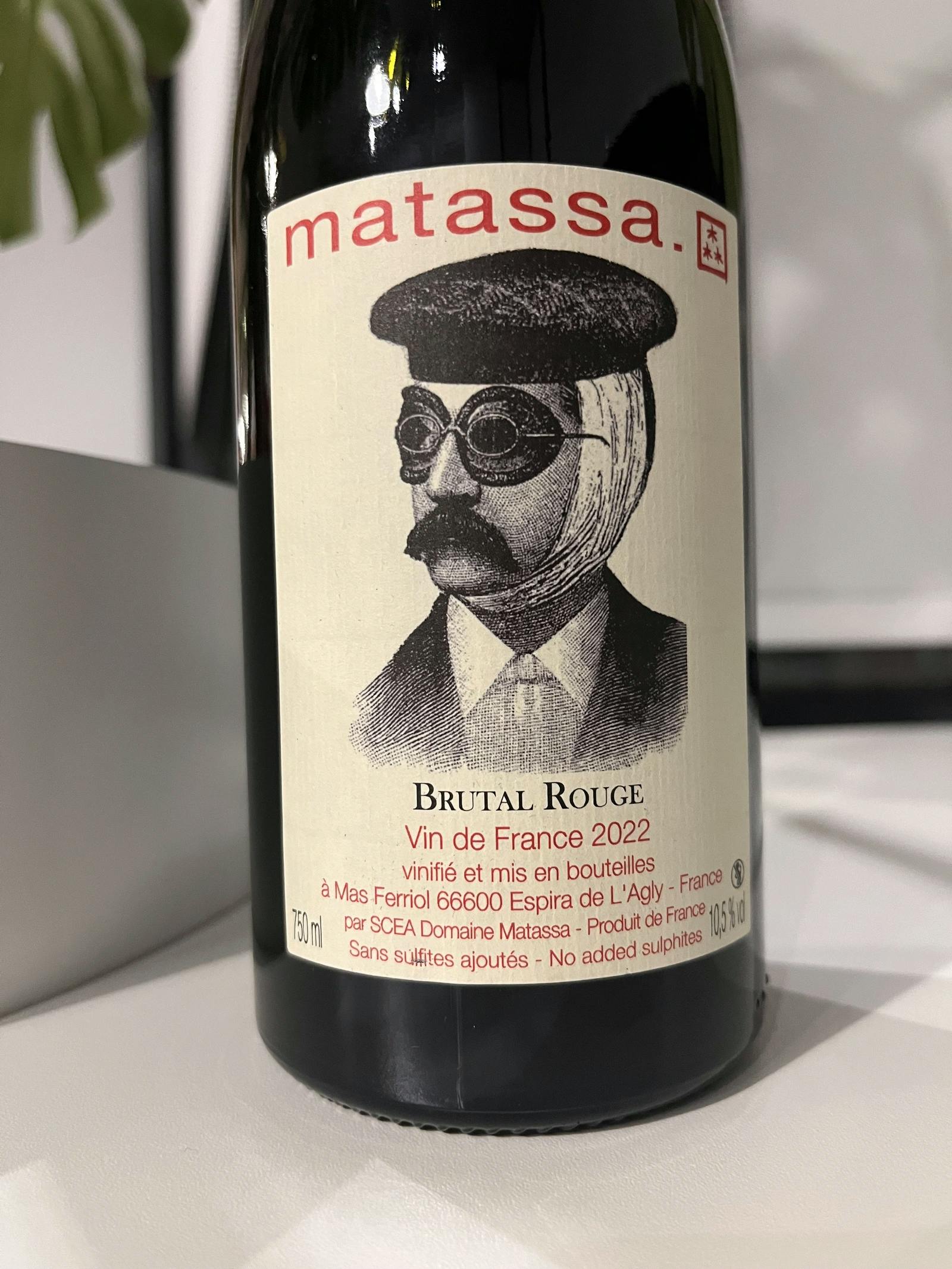
This wine secured the 🏅 6th place in our wine tasting lineup.
Domaine Matassa is a small, naturally farmed estate located in the township of Calce in the Val d'Agly region of Roussillon, Pyrenee-Orientales, France. As of 2022, they own 15 hectares of vineyards around the village of Calce. Vines are between 30 and 115 years old. Their focus is on the indigenous varieties of Northern Catalunya, including Grenache Gris, Maccabeu, Muscat d'Alexandrie (also known as Zibbibo), Lladonner Pelut (the Catalan Grenache), Carignan, and Mourvedre. Their wines are gentler in terms of alcohols, tannins and oak influence, more lively wines in terms of acidity or, ideally, deeper mineral sensations of freshness.
The estate is owned by three incredible people - Tom Lubbe, his wife Nathalie Gauby and Sam Harrop MW. Tom and Sam are from New Zealand, while Nathalie is from Roussillon. And Matassa is located in Roussillon… Sounds suspicious. Cherchez la femme!
Tom Lubbe was born in New Zealand but grew up in South Africa, where he established the famous The Observatory. Together with Eben Sadie, Tom ignited the wine revolution in the Swartland region - fresher, purer, with fewer winemaker interventions between grape and bottle.
But before becoming a star of Cape Town, Tom worked for Louise Hofmeyer. She used exclusively indigenous yeasts and worked with lower yields and little or no new wood. In 1999, to gain more experience with Mediterranean grapes, Louise recommended Tom to do a stage at the legendary Domaine Gauby in Calce, in France's Roussillon. Initially, he planned to work there for 3 months only, but Gérard Gauby quickly befriended Tom and invited him to return for three more vintages. This is where he met his wife, Nathalie Gauby, who happens to be Gérard's sister.
The birth of their first child made Tom reconsider moving back to South Africa, opting to stay in to start his own estate. Matassa was founded in 2003. Yet they didn't have a cellar, so their first vintage was made in the recently married couple's living room. Gérard felt so bad about this that he gave Tom the old Gauby in 2004.
Now many people come to Matassa to gain experience from the legendary winemaker.
Montevertine Pian del Ciampolo 2020
- Region
- Italy » Tuscany » IGP Toscano
- Type
- red still, dry
- Producer
- Vintage
- 2020
- Grapes
- Sangiovese, Canaiolo, Colorino
- Alcohol
- 13
- Volume
- 750 mL
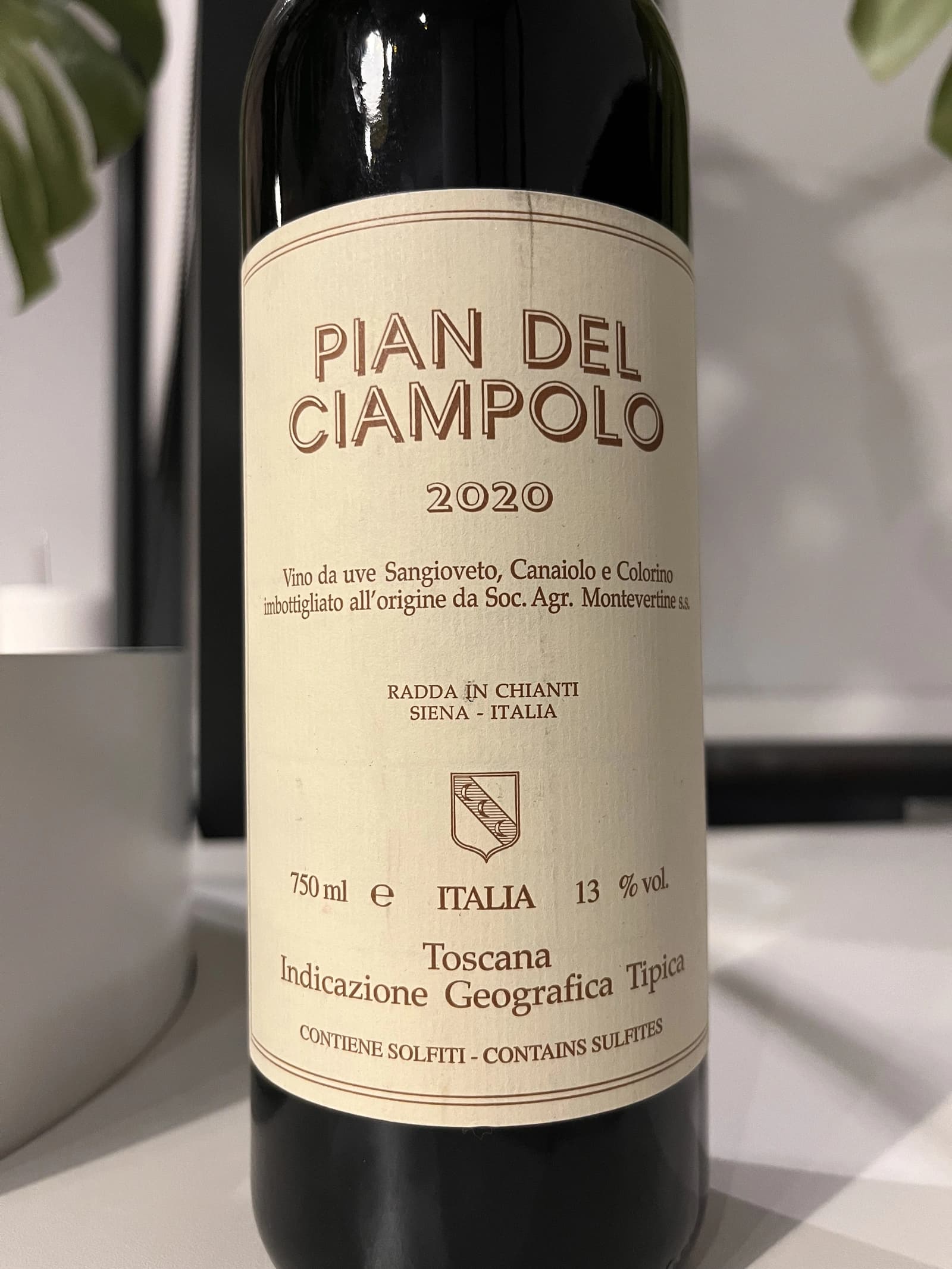
This wine secured the 🏅 7th place in our wine tasting lineup.
Montevertine, a beacon of traditional winemaking, is beautifully situated in the heart of the Chianti hills, in Radda in Chianti, Tuscany, at an altitude of 425 meters above sea level. This estate, steeped in history and winemaking tradition, focuses exclusively on grape varieties indigenous to the Chianti area: Sangiovese, Canaiolo, and Colorino. At Montevertine, the philosophy is grounded in simplicity, respect, and meticulous attention to detail, principles that have remained unchanged since their first harvest.
The Montevertine estate has a rich history, dating back to the 11th century. Originally built for defence, it was later converted into a farmhouse, with remnants of the original structure still visible. In 1967, the estate underwent a significant transformation when Sergio Manetti, an iron and steel industrialist, purchased it as a holiday home. Planting two hectares of vineyards and setting up a small winemaking cellar, Manetti initially produced wine as gifts for friends and customers. The success of his first vintage in 1971 at the Vinitaly show in Verona marked the beginning of a new chapter for Montevertine. With the assistance of Giulio Gambelli and the support of his faithful cellarman Bruno Bini, Manetti devoted himself entirely to winemaking, leading to the expansion of vineyards and cellar facilities. Following Manetti's passing in 2000, his son Martino Manetti took over, continuing to uphold the winery's traditional values and practices.
The winemaking process at Montevertine is emblematic of their commitment to tradition. The hand-picked grapes undergo fermentation in vitrified concrete vats, a process that eschews temperature control and involves two pumping-over operations daily for a gentle extraction of tannins. This approach allows for a more nuanced and elegant tannic structure. Following racking, the malolactic fermentation begins in the same concrete vats, further enhancing the wine’s complexity and smoothness. Once fermentation is complete, the wines are transferred to wood barrels for about two years to age. The ageing process is carried out in Slavonian and Allier oak barrels, ranging from 5.5 to 18 hectoliters, as well as in 225-liter Allier barriques. True to their philosophy, Montevertine's wines are never filtered and are all bottled by gravity, preserving the wine's integrity and authenticity.
Pian del Ciampolo, Montevertine's versatile (read 'basic') wine suitable for all occasions, is a blend predominantly made from Sangiovese, complemented by Canaiolo and Colorino. These grapes are sourced from all the estate's vineyards and are aged in Slavonian oak barrels for one year. With Pian del Ciampolo undergoes a 25-day alcoholic fermentation in concrete vats, followed by malolactic fermentation in the same vats. After 12 months of ageing in oak and an additional three months in the bottle, this wine emerges as a true reflection of the Chianti terroir, embodying the character and tradition of Montevertine.
Piercarlo Culasso Barbaresco Faset Duesoli 2018
- Region
- Italy » Piedmont » Barbaresco DOCG
- Type
- red still, dry
- Producer
- Vintage
- 2018
- Grapes
- Nebbiolo
- Alcohol
- 14.5
- Volume
- 750 mL
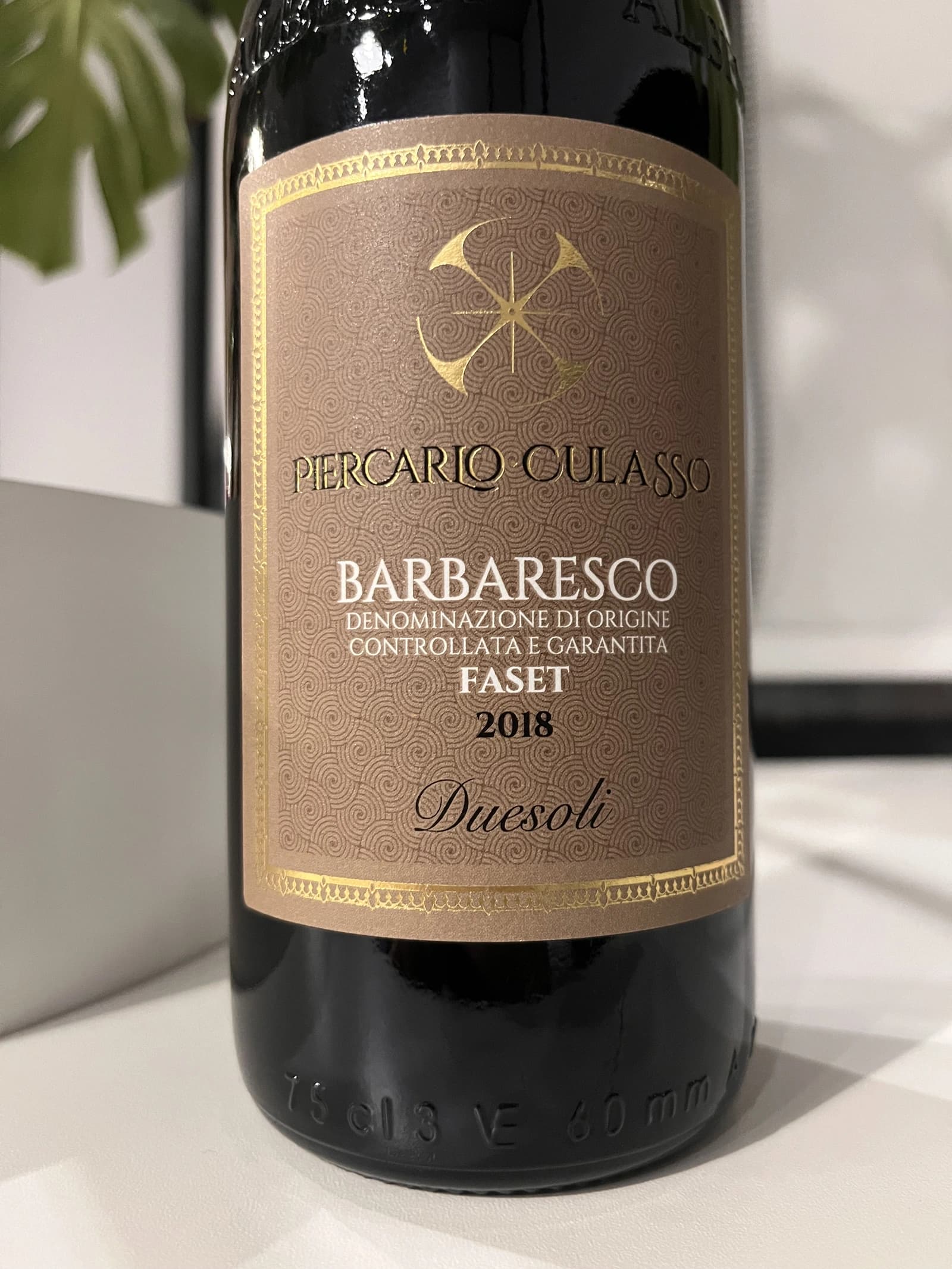
This wine secured the 🥉 3rd place in our wine tasting lineup.
Established in 2017, the family-run winery embarked on its vinification journey with a focus on crafting wines from the Nebbiolo grapes sourced from their own vineyards located in the sub-zone of Faset. The roots of winemaking run deep in the family, tracing back to the 1970s when Piercarlo's father, Dante, engaged in wine production. Piercarlo joined the family venture in 2000, dedicating several years to meticulously cultivating the vineyards. With each passing year, his expertise flourished, leading to a significant reduction in the use of chemicals in the vineyards. He used various types of green manure between the rows, tailored to the soil composition, focused on thinning practices, and took measures to prevent excessive sun exposure to the grape clusters.
The enduring objective in the vineyard has been to harvest mature yet still fresh, crisp, and uncooked clusters. In 2017, Piercarlo reignited the winemaking process, backed by the unwavering support of his family. The wines produced are a testament to the legacy of old vineyards and time-honoured traditions, passed down from father to son, resonating with the essence of their lineage.
In the winery, innovations have been embraced to yield clean, flawless wines, avoiding any excessive interventions. This approach ensures that each glass of wine embodies the clearest possible expression of that particular vintage. Recognizing that every vintage is distinct, with its own set of characteristics, it's pivotal to discern these nuances in the glass and comprehend how the grapes reacted to varying conditions presented throughout the season. Through a blend of ancestral wisdom and modern innovation, Piercarlo Culasso strives to encapsulate the purest expression of their terroir and the resilient Nebbiolo grape in every bottle crafted.
Duesoli is a distinguished Nebbiolo wine that captures the essence of its unique vineyard location in the Faset cru within the renowned municipality of Barbaresco. The vineyard's name, Duesoli, is inspired by its remarkable geographical setting. Perched on a steep slope with a south-western exposure, the vineyard overlooks the serene Tanaro River. In the evenings, as the sun sets, its rays descend towards the horizon and reflect off the river's surface. This creates a distinctive double illumination that bathes the vine rows in a reflected glow, contributing to the distinctiveness and intensity of the wine.
Situated at an altitude of 250 meters above sea level, the Duesoli vineyard benefits from an ideal south and south-west facing exposure, which is crucial for the Nebbiolo grape's development. The unique microclimate and terroir of this region play a significant role in shaping the character of the wine.
The winemaking process for Duesoli is carried out with care. The Nebbiolo grapes undergo fermentation in stainless steel containers for about 15 to 20 days under strictly controlled temperatures. This is followed by a soft pressing and racking, after which the wine is transferred to wooden barrels for further maturation. The wine is aged for approximately twenty-four months in French oak barriques, which have been used several times (various passages). This aging process in barriques imparts depth and complexity to the wine, enhancing its flavor profile.
The first vintage of Duesoli was produced in 2017.
Jacquesson Cuvée 746 Grand Vin (2018) NV
- Region
- France » Champagne » Champagne AOC
- Type
- white traditional sparkling, extra brut
- Producer
- Wine
- Vintage
- NV, based on 2018
- Disgorged
- 2022-11
- On lees
- 36 months
- Grapes
- Pinot Meunier, Chardonnay, Pinot Noir
- Alcohol
- 12.5
- Sugar
- 2
- Volume
- 750 mL
- Find at
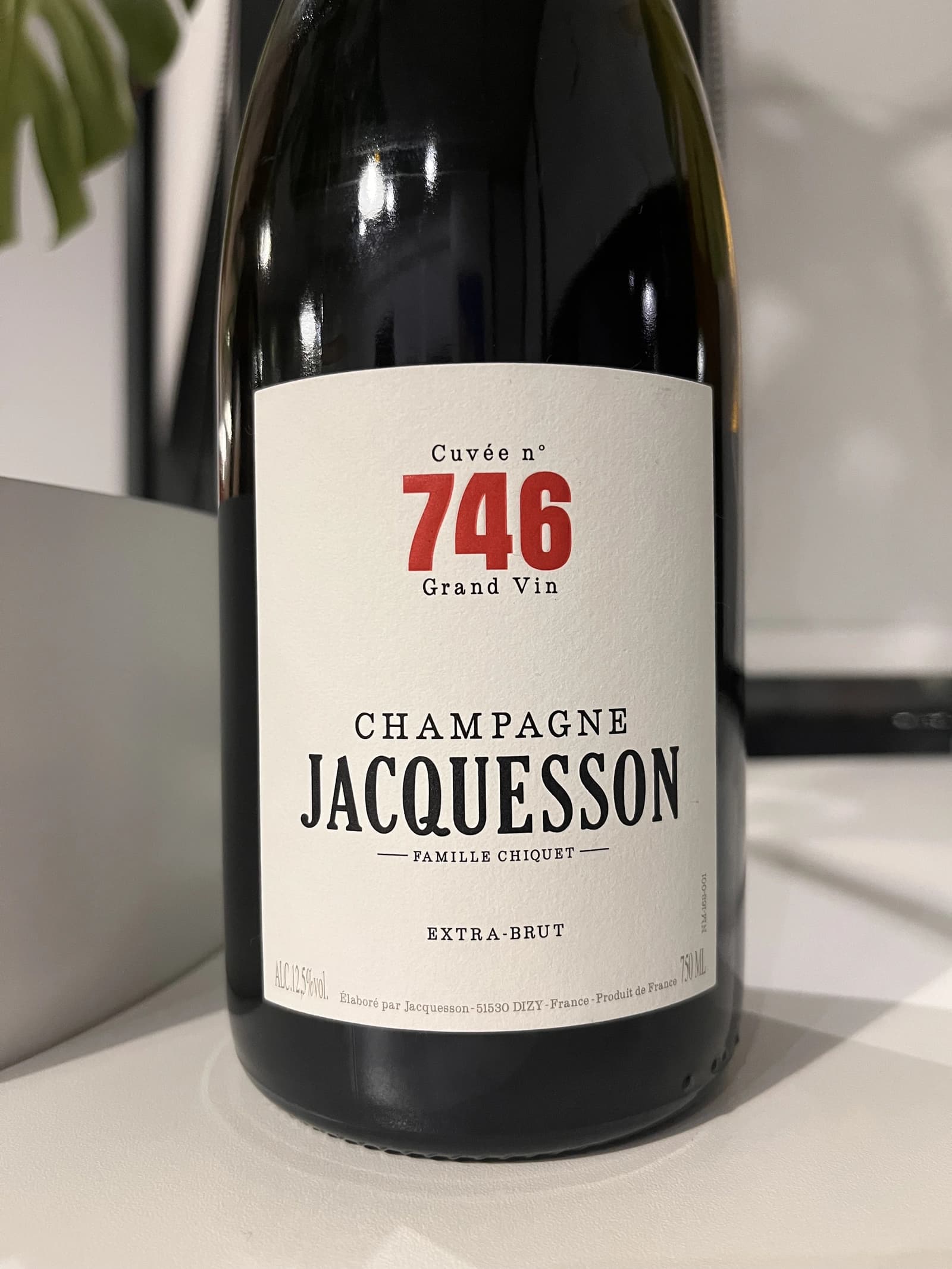
This wine secured the 🏅 4th place in our wine tasting lineup.
Jacquesson, one of the most venerable houses in the Champagne region, has undergone a revolutionary transformation under the leadership of the Laurent and Jean-Hervé Chiquet brothers. Since taking over from their father in the 1990s, the Chiquets have steered Jacquesson away from conventional winemaking practices, embracing a terroir-based, herbicide-free philosophy. Their groundbreaking decision to retire the house's 150-year-old non-vintage blend in favour of a single-vintage-based cuvée was a bold move that marked a departure from Champagne's tradition of striving for a consistent house style. These change not only reflects Jacquesson's commitment to quality and terroir but also signifies their willingness to embrace the unique characteristics of each vintage.
Jacquesson's approach to winemaking is characterized by a focus on expressing the unique qualities of each vintage, a philosophy that diverges from the norm in Champagne, which focuses on producing consistent wine each year. The Chiquets' decision to prioritize expression over consistency is evident in their numbered cuvées, starting with 728 based on the 2000 vintage. Each cuvée is a reflection of the year's harvest, with blends changing annually yet consistently showcasing a mix of Chardonnay, Pinot Noir, and Pinot Meunier. The winemaking process remains constant, featuring vinification in large old oak barrels, ageing on lees with weekly bâtonnage, minimal dosage, and no filtration. This method has garnered widespread acclaim for its transparency and remarkable minerality, highlighting Jacquesson's commitment to quality and innovation.
In addition to the 700 Series, Jacquesson produces limited quantities of single-vineyard cuvées, each representing a unique parcel of vines. These Champagnes, lauded for their extraordinary expression of terroir, are made from small plots in Dizy, Avize and Aÿ. Jacquesson is also renowned for its late-disgorged older vintages, distinguished by their elaborate Baroque labels reminiscent of the 1840s. This aspect of Jacquesson's production underscores the house's devotion to crafting Champagnes that are not just excellent but also historically resonant and deeply connected to their heritage.
Like it wasn't enough, Laurent and Jean-Hervé Chiquet brought one more novelty to the Champagne landscape. All wines of the 700 Series (in spite of Grand Crus and Mlllésimes they used to produce before 2000) come in two versions - regular and late disgorgement, with around 3 and 7-8 years on fine lees. This gives a unique chance to compare wine development on lees and post-disgorgement.
Since its establishment in 1798 by Memmie Jacquesson, the house of Jacquesson has traversed a fascinating journey. Initially basking in the glory of Emperor Napoleon's gold medal endorsement in 1810, the house experienced a period of decline before being sold in the late 19th century. Intriguingly, it was in 1843 that Johann-Joseph Krug departed Jacquesson to establish his own now-famous Champagne house. A pivotal turn for Jacquesson arrived with its acquisition by Jean Chiquet in 1974, who later passed the reins to his sons. Fast forward to 2022, and Jacquesson entered a new chapter under the stewardship of François Pinault's Artémis Domaines, part of the Groupe Artémis conglomerate, which also encompasses esteemed entities like Christie’s auction house, and luxury brands Gucci and Balenciaga. Furthermore, Artémis Domaines manages Château Latour and an exclusive selection of premier wine estates across France and California. Today, Jacquesson stands as a distinguished member of a modern French empire, one synonymous with the pinnacle of luxury.
[…] Jacquesson’s small size as a maison producing 250,000 bottles per year, its strong vigneron culture and its image as "champagne for the wine connoisseur" are all elements very much aligned with our philosophy at Artémis Domaines and are very compatible with our other domaines.
Cuvée 746, born from the 2018 harvest, is composed of grapes from Aÿ, Dizy, Hautvillers (68%), Avize, and Oiry (32%) with a small portion of reserve wines. It reflects a season that began with a rainy winter and a mild, stormy spring, followed by fine, dry conditions from June onwards. These climatic conditions led to an early harvest, yielding grapes in perfect health with excellent ripeness and moderate acidity. After, vinification and élevage in oak casks on lees, the wine spends 3 years in the bottle on lees before disgorgement in November 2022.
Resources
- Pierre-Yves Colin-Morey. Fine Wines International.
- The Comprehensive Guide to Pierre Yves Colin Morey. Jammy Wine.
- Maison Pierre-Yves Colin-Morey. Berry Bros & Rudd.
- Pierre-Yves Colin-Morey. Skurnik.
- Fazenda Augalevada. The Source Imports.
- Piercarlo Culasso.
- Muchada-Léclapart.
- Domaine Matassa. Chateau Monty.
- Matassa. Louis/Dressner Selections.
- Montevertine.
- Jacquesson.
- Jacquesson. The Rare Wine co.
- Champagne Jacquesson: a new campaign for a vintage champagne house. Autumn/Winter 2023/24 issue of LUX.
- Jacquesson. ViniBianchiRossi.
Raw scores
Footnotes
-
Lutte raisonnée (literally 'reasoned struggle') is an approach to viticulture which permits the application of agrochemicals only when absolutely necessary and not as a matter of routine. Practically, that means no chemicals unless there is a high risk of losing harvest or vines altogether. ↩